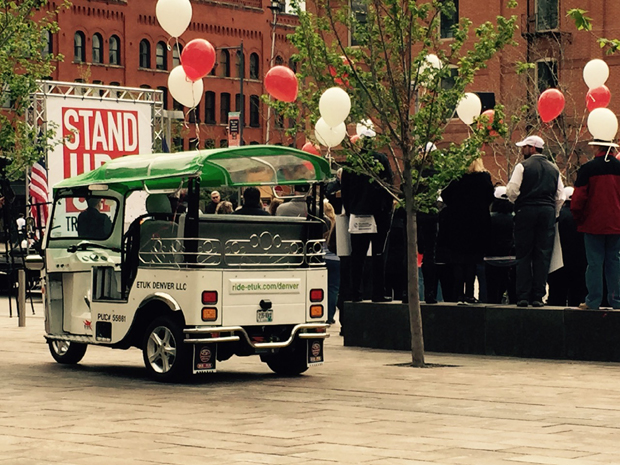Going downtown? Call the tuk-tuk
They're called tuk-tuks, presumably because of the sound made by their two-stroke engines, and for decades they've been the in-town transportation mode of choice in many Asian metro areas.
Tuk-tuks are motorized, three-wheel rickshaws. Their relatively low speeds, along with their maneuverability and adaptability -- they can be customized for passenger, food vending and cargo service -- make them perfect for getting people and goods across crowded cities.
And now, as more Americans eschew cars and look to live in urban areas, one Denver-based group believes it's time for a U.S. version of the tuk-tuk.
Denver-based eTuk USA, working with a manufacturer in Amsterdam, recently unleashed an American-made, electric battery-powered version of the tuk-tuk on the streets of Colorado's capital.
Michael Fox, the company's director of sales and marketing, points out their product is a far cry from the noisy, dangerous, dirty, "tin can" tuk-tuks used elsewhere. "These are steel construction, roll bars," he tells CBS MoneyWatch. "These are solid vehicles."
They're also geared to larger, North American bodies, and can handle anywhere from three to six passengers.
Fox and his business partners also have a second company, eTuk Denver, a commercial shuttle service, that's been getting a lot of traction with tourists and consumers. Fox says the tuk-tuk solves the problem of what transportation experts and urban planners call the "last mile concept."
"Public transportation will get you into the city, but how do you get from where the public transportation drops you off to your final destination," says Fox, "whether it be your home, whether it be your office?"
Like their Asian counterparts, these tuk-tuks are made to shuttle people around urban areas. They have a maximum speed of 25 mph and are restricted to roads with speed limits of 35 mph or less, within a five mile radius of Denver's Union Station.
But by charging a flat fee in downtown Denver of $3 per passenger with maximum bill of $11, and slightly more in the city's outlying neighborhoods, Fox says the tuk-tuks offer consumers a safe, affordable, easily-accessible and predictable mode of transportation.
And the concept of the tuk-tuk appears to be gaining momentum: Fox says his company is already in talks with Boston, Nashville, Riverside, California, Orlando, Las Vegas, Austin and a variety of other cities, both large and small, that are looking for ways to get people to and from that "last mile" of public transportation.
